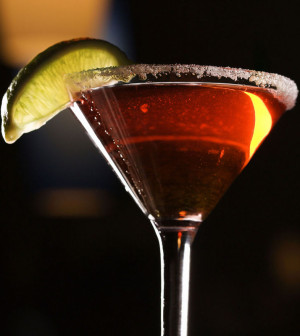- 7 Best Breads for Maintaining Stable Blood Sugar
- Gelatin vs. Collagen: Which is Best for Skin, Nails, and Joints?
- The Long-Term Effects of Daily Turmeric Supplements on Liver Health
- Could Your Grocery Store Meat Be Causing Recurring UTIs?
- Are You Making This Expensive Thermostat Error This Winter?
- Recognizing the Signs of Hypothyroidism
- 10 Strategies to Overcome Insomnia
- Could Artificial Sweeteners Be Aging the Brain Faster?
- Techniques for Soothing Your Nervous System
- Does the Water in Your House Smell Funny? Here’s Why
Older Age May Mean Fewer Hangovers


FRIDAY, Sept. 13Here’s some good news for anyone who’s ever woken up fuzzy-headed and bleary-eyed after a night of heavy boozing: New research suggests that hangovers fade with age.
A large study of Danish people finds that hangover symptoms are much less likely to strike people aged 60 and older compared to their younger counterparts.
But don’t start dreaming of post-retirement pub-crawling without pesky consequences the day after. It’s unclear why older people might suffer from fewer hangovers. They might be savvier about how to avoid them, or they might simply be more tolerant of alcohol consumption. A combination of factors could also be at play.
Whatever the case, the research is important for more than what it says about the effects of drinking over a lifetime, said study co-author Richard Stephens, a senior lecturer in psychology at Keele University, in England. Scientists know that people who get the worst hangovers are more likely to become alcoholics, he said, possibly because drinkers who get them try the “hair-of-the-dog” approach and drink more the day after.
If people become less likely to develop alcoholism as they age, they should have fewer hangovers too, Stephens said, “and that is what we found.”
Although scientists seem to be fascinated by alcohol and its effects on the body, they haven’t spent much time studying hangovers. Never mind that they’re very common, affecting an estimated half of people when their blood alcohol level reaches 0.11 percent, which is too drunk to drive legally in the United States.
For reasons that aren’t clear, an estimated 20 percent to 25 percent of people are immune to hangovers. Research suggests that smoking, on the other hand, makes hangovers worse.
In the new study, researchers examined the results of surveys of nearly 52,000 people aged 18 to 94 in Denmark. The respondents answered questions about consumption of food and drink and about hangovers, among other things.
People aged 60 and up drank the most — an average of 15 drinks a week for men and 10 for women, compared with 14 drinks for men and seven for women aged 18 to 29. The younger people, however, drank heavily more often.
Hangover symptoms after heavy drinking were much more common in the younger people. Sixty-two percent of men aged 18 to 29 reported exhaustion after drinking, for example, compared with just 14 percent among those aged 60 and older. Nausea was much less common (1.5 percent vs. 10 percent) among older men, as was dizziness (1.5 percent vs. 8 percent) and stomachache (1.4 percent vs. 6.2 percent).
The results for women were more closely matched: Nausea was only half as common (11 percent vs. 21 percent) in the older women compared to the younger ones. Headaches were somewhat less common: 21 percent vs. 27 percent.
The researchers said three factors — amount of alcohol consumed, frequency of heavy drinking and amount of food eaten with booze — don’t throw off the basic findings.
What’s going on? One theory is that a form of “natural selection” is at work, Stephens said. Perhaps heavy drinkers who suffer the worst hangovers simply quit drinking too much.
Dr. Robert Swift, a professor of psychiatry and human behavior who studies substance abuse at Brown University, said another possibility is less smoking — which appears to worsen hangovers — in older people.
“The study adds another bit of knowledge about hangovers,” Swift said. “However, we still do not understand the cause.”
Swift also said there’s no evidence that hangovers actually make people less likely to drink.
The study appeared online Sept. 12 and will appear in an upcoming print issue of the journal Alcoholism: Clinical & Experimental Research.
More information
For more about hangover treatments, try the U.S. National Library of Medicine.
Source: HealthDay
Copyright © 2026 HealthDay. All rights reserved.










